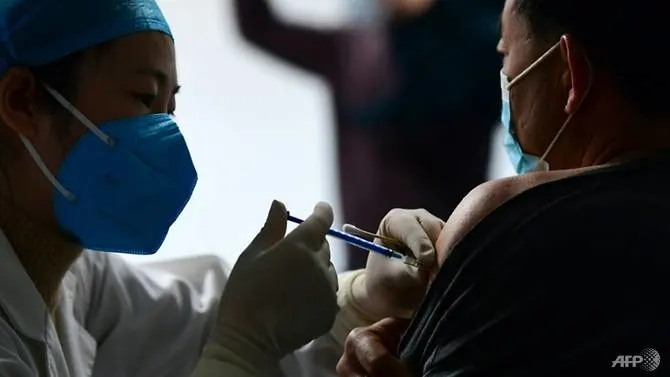Chinese urgency in COVID-19 goes missing in vaccination drive
07 March, 2021

Shirley Shi has received 3 offers to get vaccinated against COVID-19 - through her hometown, her Beijing residential place and her office location - but the recruiting manager is in zero rush.
"I'd like to look out for any adverse effects initially," explained Shi, who like many Chinese appears happy to have a wait-and-see approach.
Through aggressive lockdowns and mass testing of millions, China has had success controlling the virus that first surfaced about its soil in late 2019.
But vaccinating the world's most populous country is a different story.
China is still attempting to ramp up production of its four domestically-produced vaccines and offers yet to approve any foreign-made shots found in a global competition for bragging rights.
For Shi, the challenge is not accessibility, but too little urgency.
"With China's control of the epidemic domestically and my own lack of strategies to go abroad in the near-term, you don't have for the present time," she said.
Chinese professionals have signalled the vaccination level could soon quicken.
Zhong Nanshan, a respected pulmonologist and key countrywide figure on the fight against COVID-19, said recently that China plans to immunise 40 % of its 1.4 billion persons by June.
That could require massively increasing the quantity of jabs given in China, where currently only around 3.5 % of the populace is inoculated.
That's considerably behind the United Kingdom's 32.99 jabs per 100 people and the United States' 25.42, according to your World in Data, a good collaboration between Oxford University and a good charity.
"The sense of urgency that exists in the West, where vaccination is a minimum of an expected game-changer, is not within China," said Mathieu Duchatel, director of the Asia Programme at Institut Montaigne, a Paris-based think tank.
China has already established success controlling COVID-19, but vaccinations found in the world's most populous country have proceeded slowly. (Picture: AFP)
HEALTH RISKS
The slower pace could pose challenges for China by delaying herd immunity.
There is absolutely no globally-accepted standard for the percentage of a population that should be jabbed - or to develop the necessary antibodies through infection - for herd immunity against COVID-19 to kick in.
A good November paper in medical journal Lancet estimated that percentage at 60 to 72 for a 100 % effective vaccine, while Gao Fu, the top of the Chinese disease control company, put it at 70 to 80 per cent for China in comments this week.
China would have to administer 10 million doses every day for seven weeks to reach such thresholds, Chinese infectious disease specialist Zhang Wenhong told a recently available forum. Only around 52.5 million doses have been administered by end-February, regarding to Zhong.
The existing pace is of "great concern", Zhang added.
China has committed to delivery COVID-19 vaccines overseas as it gets results to blunt foreign criticism of the initial pass on of the virus from its shores. (Image: AFP/Handout)
Besides quickening development, China has also focused on shipping vaccines overseas since it works to blunt foreign criticism of the initial spread of the virus from it has the shores.
Chinese companies are established to export almost 400 million doses, state media has reported, and the federal government said it is providing free of charge vaccines to 53 countries.
China is caught between "both vaccination requirement of achieving herd immunity ... and the demand associated with it has the vaccine diplomacy", explained Huang Yanzhong Huang, a worldwide health and wellbeing fellow at the US Council on Foreign Relations.
Huang said delays found in herd immunity could mean China falls behind found in reopening its borders - nowadays largely closed to all or any but Chinese citizens - even though other economies forge in advance.
This "might make China seem bad", he said.
SCEPTICISM
In China, open public take-up of the vaccine may also be slowed by trust issues in a country with a brief history of drug-safety scandals.
General market trends firm Ipsos found in January that 85 per cent of adults in China said they were ready to get jabbed, but it was first unclear how soon they would do so.
At one Beijing clinic, a health care provider said jabs have been wanted to all staff, but many demurred until even more info on vaccine efficacy was obtainable.
Some are going for a wait-and-see method of getting vaccinated against COVID-19 in China. (Image: AFP/Noel Celis)
Chinese producers are yet to release detailed data, unlike their foreign rivals.
China's vaccinations started last year with key organizations like medical staff and state staff headed overseas. It has been expanded to various other citizens, although generally in the largest cities.
With its resources and demonstrated ability to mobilise for a mass effort, China may catch through to vaccination costs once supplies increase.
Zhang Yutong, a good dental clinic employee, was first among a reliable flow of folks streaming in to one particular Beijing clinic after her company arranged for jabs.
She told AFP nearly two-thirds of her colleagues had likewise taken the offer.
"The epidemic has turned into a regular portion of life. It's better to have antibodies," she explained.
Source:
